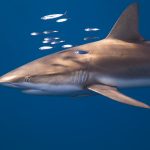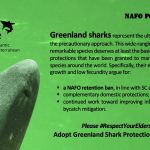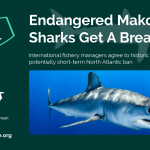Northwest Atlantic fishing nations ban retention of longest-lived vertebrate
Porto, September 23, 2022. Today, the mysterious Greenland shark – thought to have
the longest lifespan of any vertebrate – was granted new, historic protections
by the Northwest Atlantic Fisheries Organization (NAFO) on the final day of its
annual meeting. The US and Canada, with support from the UK and the EU, proposed
and secured a science-based ban on retaining the species from international
waters.
“The incredibly slow growing, long-lived, and wide-ranging Greenland shark clearly deserves the precautionary international
protection that was agreed today,” said Sonja Fordham,
president of Shark Advocates International, who testified in support of the
proposed ban on behalf of the Shark League coalition. “We thank the United
States and Canada for their steadfast efforts over several years to secure science-based
safeguards for this extraordinary animal and we urge all Parties to adopt
similar protections for their waters.”
Scientists have estimated that Greenland sharks may live 400 years and
don’t reproduce until about age 150, leaving populations exceptionally vulnerable
to overfishing. In 2018, the NAFO Scientific Council recommended a complete ban
on retaining Greenland sharks, along with measures to collect information and
minimize incidental mortality associated with “bycatch.” That year, the US and
EU secured catch reporting requirements and a partial ban (on targeting the
species in international waters).
The new measure bans Greenland shark fishing, retention, transshipment, and
landing (part or whole) and applies to international waters of the Northwest
Atlantic. Exceptions are
possible where domestic bans on discarding fish apply (Iceland, Norway, Faroe
Islands, and Greenland), but only for dead Greenland sharks captured
incidentally; commercial profit from such landings is prohibited. Parties also underscored
previous commitments to report on efforts to minimize incidental catches and
mortality of Greenland sharks. NAFO scientists will continue their work to identify
times and areas where Greenland shark bycatch is high and will provide
additional conservation advice in 2024.
“As we celebrate this important shark conservation advance, we encourage
NAFO Parties to follow up promptly with required reports on Greenland shark
catches and bycatch mitigation,” said Shannon Arnold, marine policy coordinator for
Ecology Action Centre. “This information is essential to the next
key steps of identifying hotspots and changing fishing practices to minimize
harm.”
Greenland sharks are associated with high latitudes of the North Atlantic and Arctic waters at depths to 3000 meters, but specimens have been reported as far south as Belize. Growing to more than six meters (21 feet), they were heavily fished in the early 1990s for liver oil. Today, Greenland sharks are primarily caught incidentally and sometimes used for their meat in Iceland and Greenland.
Media
contact: Sonja Fordham
email: sonja@sharkadvocates.org Tel: +1 202 436 1468.
Notes to
Editors: The Shark League is a
coalition of Shark Advocates International (a project of The Ocean Foundation),
Ecology Action Centre, Shark Trust, and PADI AWARE Foundation formed with
support from the Shark Conservation Fund to advance science-based shark
policies for the Atlantic and Mediterranean.
NAFO Contracting Parties include Canada, Cuba, Denmark (in respect to the Faroe Islands and Greenland), the European Union, France (in respect to Saint Pierre et Miquelon), Iceland, Japan, Republic of Korea, Norway, Russian Federation, Ukraine, and the US.
Northwest Atlantic Fisheries Organization (NAFO) 2022 Position Statement: Skates & Sharks






